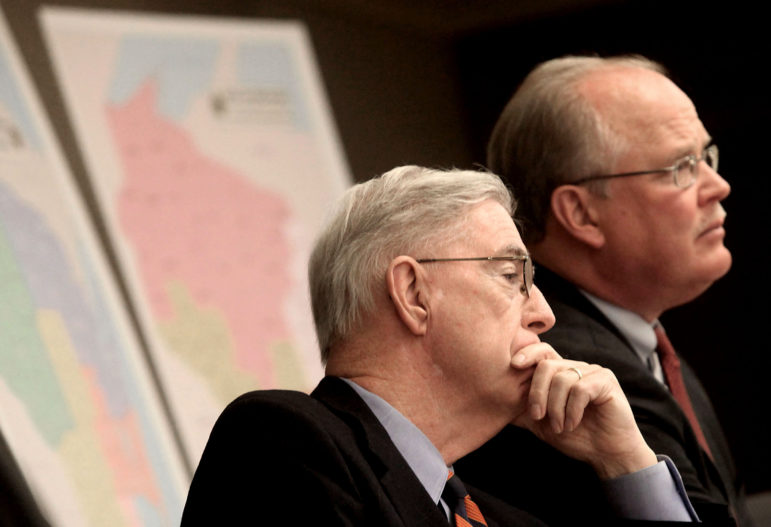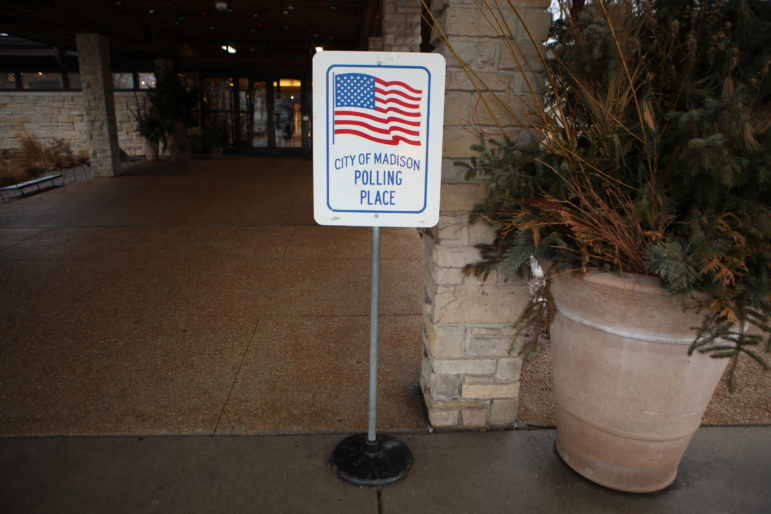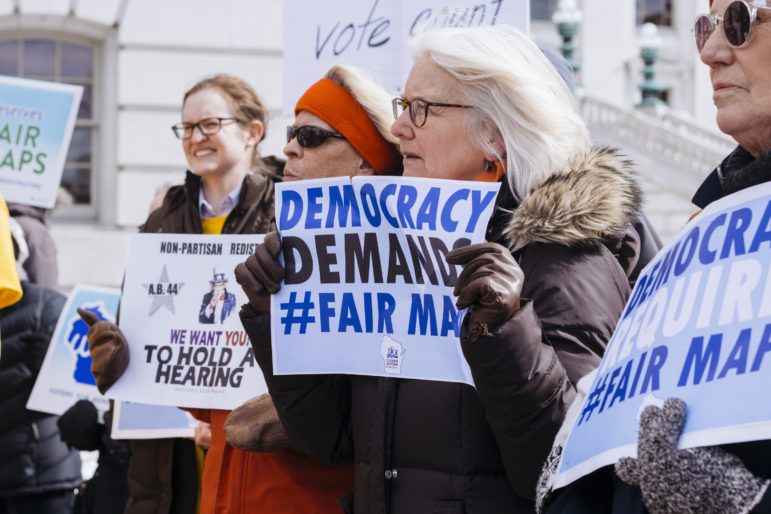The Push for Nonpartisan Redistricting
Advocates push for Wisconsin to enact a redistricting process similar to Iowa's system.

State Sen. Dave Hansen, D-Green Bay, speaks at Maps Madness: Voters vs. Politicians, a rally organized by the Wisconsin Fair Maps Coalition outside the Wisconsin state Capitol on March 7, 2018. The rally was an unsuccessful effort to convince legislators to hold a special session on a bill sponsored by Hansen calling for a nonpartisan redistricting process. Photo by Cameron Smith/Wisconsin Center for Investigative Journalism.
No matter which way the U.S. Supreme Court decides, change could be coming to Wisconsin’s partisan system for redrawing electoral districts.
In a decision that could come down any day, the nation’s highest court will decide a lawsuit challenging the U.S. District Court for the Western District of Wisconsin’s ruling that the 2011 redistricting was unconstitutional.
Thus far, 39 of 72 Wisconsin counties have passed resolutions in support of a nonpartisan redistricting process at the urging of groups including the Fair Elections Project, a bipartisan group that supports litigation, legislation and public advocacy to stop partisan gerrymandering; and the Citizen Action Organizing Cooperative, a group associated with Citizen Action of Wisconsin in which members pay an organizer to work on changing the state’s redistricting process.
Ultimately, these activists envision a system similar to one used by Iowa, where the nonpartisan Legislative Services Agency creates the new map every 10 years. Previous voting statistics are not considered, and the homes of legislators or members of Congress are not taken into account.
The LSA uses population size as the primary determinant when considering how to redraw a district. The agency divides Iowa’s 99 counties into four congressional districts and 100 legislative districts. Appropriate shapes for districts include squares and rectangles.
Transparency with the public is key to Iowa’s redistricting success. A temporary Redistricting Advisory Commission, created by the floor leaders of the General Assembly, holds three public hearings throughout the state after the first plan is released to lawmakers, allowing citizens to comment on the proposed districts.
If the new map is voted down, the Legislative Services Agency can draw another and then another. If those maps are all rejected, then the Iowa Supreme Court will draw new maps.
“In the four redistricting processes since the Iowa law took effect in 1981, the Iowa Legislature has always passed the nonpartisan maps created by the Legislative Services Bureau without ever going to a third vote,” according to Common Cause in Wisconsin.

Then state senators Tim Cullen, D-Janesville, left, and Dale Schultz, R-Richland Center, hold an unofficial public hearing in 2014 addressing their proposal for nonpartisan redistricting at the Wisconsin state Capitol in Madison on Feb. 10, 2014. Republican leaders refused to hold an official hearing on the measure, which called for Wisconsin to adopt a nonpartisan redistricting model similar to that used by Iowa. Photo by John Hart / Wisconsin State Journal.
While they were in the Wisconsin Legislature, Democratic state Sen. Tim Cullen and Republican state Sen. Dale Schultz tried to change the system from the inside. After the 2011 redistricting, the two authored bills calling for new maps to be sent to the court if they are voted down twice.
But they never got a hearing.
Schultz and Cullen are now co-chairmen of the Fair Elections Project Wisconsin campaign, which is dedicated to helping “end the partisan gridlock” by stopping gerrymandering.
Democratic Sen. Dave Hansen of Green Bay believes Republicans and Democrats must come together and pass nonpartisan redistricting laws to give citizens fair, transparent and competitive elections.
Last session, two new redistricting bills sponsored by Democrats, including Hansen, Assembly Bill 44 and Senate Bill 13, were proposed. They called for the Legislative Reference Bureau, a nonpartisan state agency, to draw district lines and for the establishment of a Redistricting Advisory Commission. Both died after not receiving a public hearing.

Wisconsin’s 2011 redistricting is under challenge in a U.S. Supreme Court case, which the plaintiffs argue discriminates against Democratic voters to create a persistent Republican majority in the Legislature. Here, a voting sign is seen at the polling place at Olbrich Gardens on Feb. 20, 2018, in Madison. Photo by Coburn Dukehart / Wisconsin Center for Investigative Journalism.
Republican Rep. Kathleen Bernier of Chippewa Falls, chairwoman of the Committee on Campaigns and Elections, said she held an informational hearing on nonpartisan redistricting bills in 2013. She did not schedule a hearing for AB 44 because of the ongoing Supreme Court case, saying there was no need to preempt the court’s decision.
Democrats could have and should have changed the redistricting process when they held majority control in 2009 and 2010 “if that was a burning desire,” Bernier said. “Neither Democrats or Republicans, holding the majority, wanted to give up that legal and ‘constitutional’ authority.”
Under the most recent bills, the Redistricting Advisory Commission would advise the nonpartisan reference bureau in the redistricting process, make copies of potential maps available to the public, hold three public hearings on the maps, and provide summaries of those hearings and the testimony involved to the LRB.
If the high court upholds the redistricting, Republicans are unlikely to voluntarily junk a system that has worked so well for them. And it is worth restating that when Hansen’s party controlled the Legislature and governor’s office in 2009 and 2010, nonpartisan redistricting was not passed.

Marla Stephens attend Maps Madness: Voters vs. Politicians, a March 7, 2018 rally organized by the Wisconsin Fair Maps Coalition held outside the Wisconsin state Capitol. The rally was aimed at pressuring lawmakers to hold a special session to enact a nonpartisan redistricting system. Stephens, a former candidate for state Supreme Court justice, says she believes her vote has been diluted by redistricting in the Milwaukee area. Photo by Cameron Smith / Wisconsin Center for Investigative Journalism.
“If you think just electing Dems is going to solve this problem, you’re wrong,” said Marla Stephens, a former state Supreme Court candidate who is pushing to end partisan redistricting.
“This needs to be a nonpartisan issue because it’s got a nonpartisan solution. I think what’s different about why people are so upset now is all of the technology and all of the partisanship coalesced at one time for the perfect storm, where Republicans had control of all of the branches of government.”
“The people of this state deserve it, our democracy deserves it, and taking the politics out of redistricting reform is needed if we are to restore — and this is so important — the people’s faith in their government, and end the polarization we see every day in Madison and throughout the state,” Hansen said.
“The health of our democracy and our state government is at stake,” he added. “We cannot afford to wait.”
This story was produced as part of an investigative reporting class in the University of Wisconsin-Madison School of Journalism and Mass Communication under the direction of Dee J. Hall, the Wisconsin Center for Investigative Journalism’s managing editor. The Center’s collaborations with journalism students are funded in part by the Ira and Ineva Reilly Baldwin Wisconsin Idea Endowment at UW-Madison. The nonprofit Center (www.WisconsinWatch.org) collaborates with Wisconsin Public Radio, Wisconsin Public Television, other news media and the UW-Madison School of Journalism and Mass Communication. All works created, published, posted or disseminated by the Center do not necessarily reflect the views or opinions of UW-Madison or any of its affiliates.
More about the Gerrymandering of Legislative Districts
- Without Gerrymander, Democrats Flip 14 Legislative Seats - Jack Kelly, Hallie Claflin and Matthew DeFour - Nov 8th, 2024
- Op Ed: Democrats Optimistic About New Voting Maps - Ruth Conniff - Feb 27th, 2024
- The State of Politics: Parties Seek New Candidates in New Districts - Steven Walters - Feb 26th, 2024
- Rep. Myers Issues Statement Regarding Fair Legislative Maps - State Rep. LaKeshia Myers - Feb 19th, 2024
- Statement on Legislative Maps Being Signed into Law - Wisconsin Assembly Speaker Robin Vos - Feb 19th, 2024
- Pocan Reacts to Newly Signed Wisconsin Legislative Maps - U.S. Rep. Mark Pocan - Feb 19th, 2024
- Evers Signs Legislative Maps Into Law, Ending Court Fight - Rich Kremer - Feb 19th, 2024
- Senator Hesselbein Statement: After More than a Decade of Political Gerrymanders, Fair Maps are Signed into Law in Wisconsin - State Senate Democratic Leader Dianne Hesselbein - Feb 19th, 2024
- Wisconsin Democrats on Enactment of New Legislative Maps - Democratic Party of Wisconsin - Feb 19th, 2024
- Governor Evers Signs New Legislative Maps to Replace Unconstitutional GOP Maps - A Better Wisconsin Together - Feb 19th, 2024
Read more about Gerrymandering of Legislative Districts here
-
Legislators Agree on Postpartum Medicaid Expansion
 Jan 22nd, 2025 by Hallie Claflin
Jan 22nd, 2025 by Hallie Claflin
-
Inferior Care Feared As Counties Privatize Nursing Homes
 Dec 15th, 2024 by Addie Costello
Dec 15th, 2024 by Addie Costello
-
Wisconsin Lacks Clear System for Tracking Police Caught Lying
 May 9th, 2024 by Jacob Resneck
May 9th, 2024 by Jacob Resneck






















Blue wave hits Wisconsin in November of 2018, Democrats win assembly, Senate and Governorship. Decide to scrap fairer redistricting and prefer controlling map. No one seems to care especially the media so long as Republicans have no power.
Troll, you sound very passionate about fair redistricting.
In this hyper-partisn country, its nice to find something that both I, a Democrat, and you, a Republican, are passionate about.
I think we should all seek to capitalise on our common ground and push together as citizens for reform.
Sorry libtards! The Supreme Court ruled today, libtards LOSE! Republicans WIN! Ha ha! Libtards don’t get or deserve voting rights, so go cry or leave Wisconsin. Republicans will be in control FOREVER! Start packing losers!